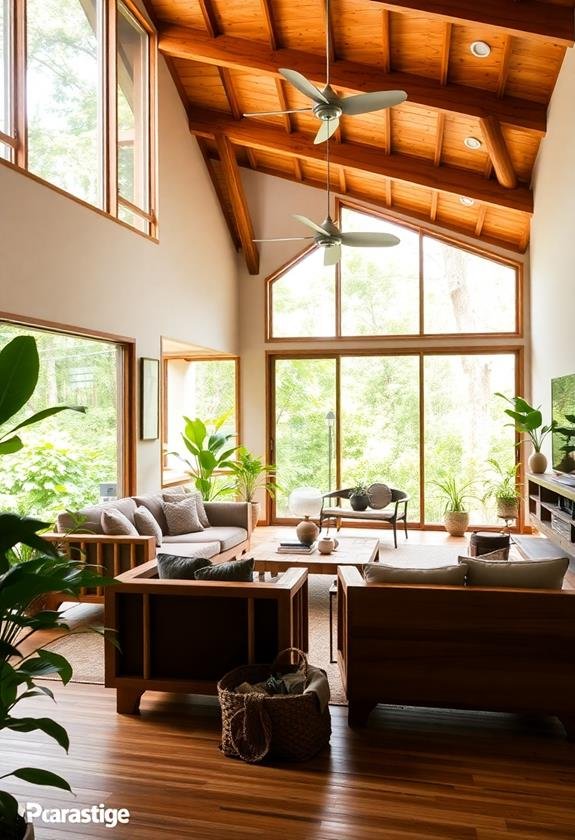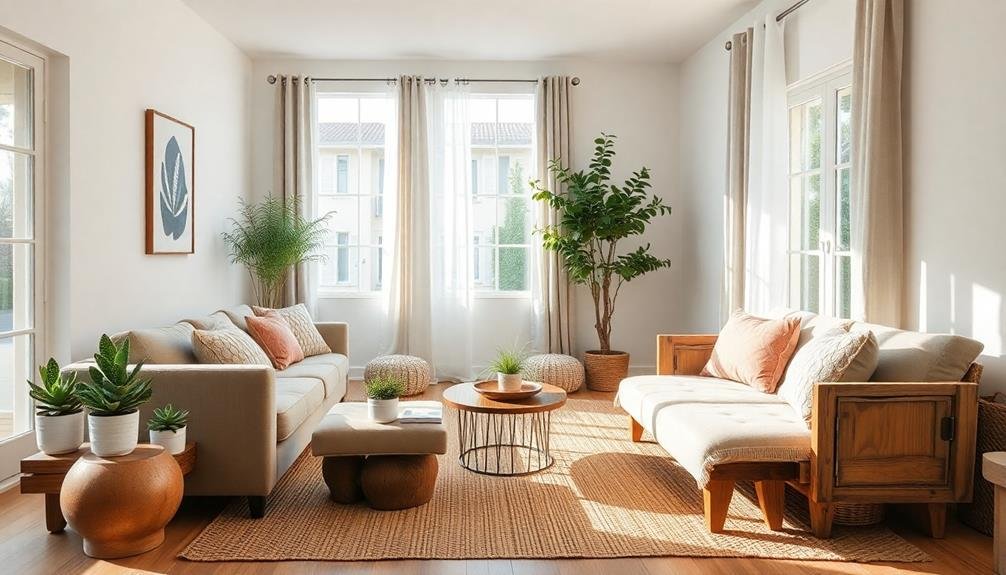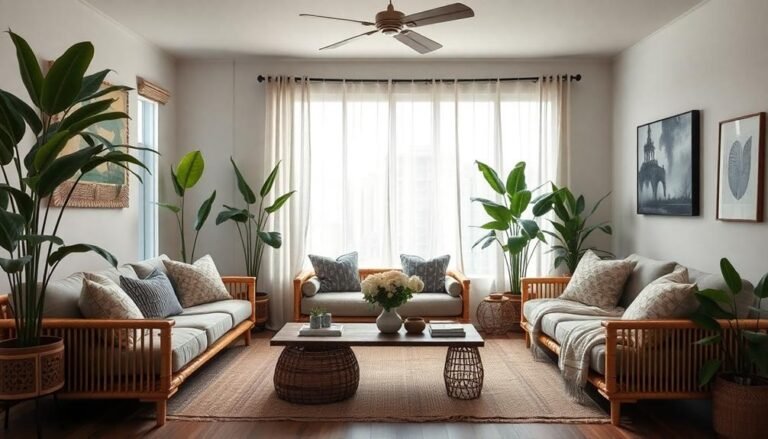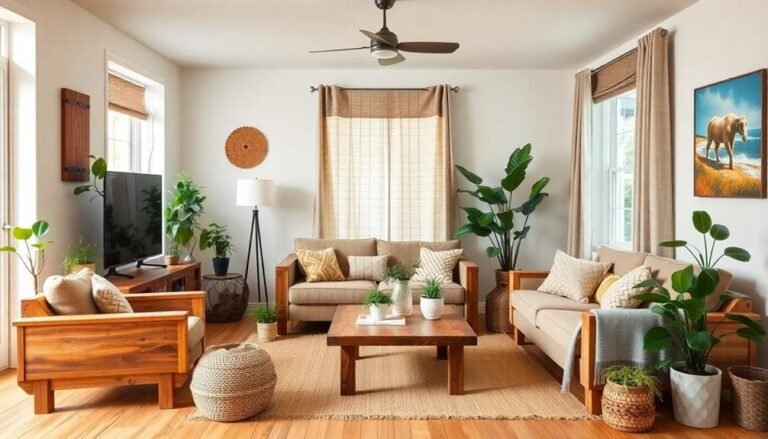Decorating with natural and organic materials brings numerous benefits to your home. First, these materials improve indoor air quality by reducing harmful emissions and enhancing moisture control, which prevents mold growth. They're also eco-friendly, as they support sustainable practices and reduce your carbon footprint. Aesthetically, natural elements add warmth and unique textures, allowing for versatile designs that elevate any space. Additionally, materials like bamboo and reclaimed wood offer impressive durability, ensuring your decor lasts longer. While initial costs might be higher, their longevity translates into cost-effectiveness over time. Curious about how you can further enhance your space?
Health Benefits of Natural Materials

When it comes to your home, the materials you choose can greatly impact your health. Opting for natural materials, like wood, stone, and organic fabrics, can contribute to better indoor air quality. Incorporating houseplants into your decor not only complements these materials but also enhances air purification, enabling you to breathe easier with houseplants. Unlike synthetic materials, which often release volatile organic compounds (VOCs), natural options minimize harmful emissions, making your living space healthier. For instance, when you select bamboo flooring instead of laminate, you're not only choosing a stylish option but also reducing the toxins in your home.
Additionally, natural materials can help regulate humidity and temperature, promoting a more comfortable environment. Materials like wool or cotton can absorb moisture, preventing mold and mildew growth, which can trigger allergies. By incorporating these elements into your décor, you're fostering a space that supports your well-being.
Moreover, using natural materials can enhance your mental health. The warmth and beauty of wood or the texture of natural fibers can create a calming atmosphere, reducing stress and anxiety. Think about how a cozy, wood-paneled room feels compared to a sterile, synthetic one. By surrounding yourself with organic materials, you're not just beautifying your home; you're also nurturing your health and happiness.
Environmental Impact of Organic Choices

Choosing organic materials not only beautifies your home but also considerably benefits the environment. When you opt for organic choices, you're supporting sustainable practices that reduce pollution and conserve resources. For instance, organic cotton, grown without harmful pesticides, requires less water than conventional cotton, making it a more eco-friendly choice. By selecting materials that are biodegradable or recyclable, such as those found in eco-friendly furniture brands, you help minimize waste that often ends up in landfills.
Moreover, organic materials typically come from renewable sources, meaning they can be replenished over time without depleting the earth's resources. This approach reduces the carbon footprint associated with the production and transportation of synthetic materials. As you incorporate organic elements, like reclaimed wood or natural fibers, you're also fostering biodiversity, as these materials often come from environments that support various life forms.
Additionally, supporting companies that prioritize organic practices encourages them to continue their sustainable efforts, creating a ripple effect in the industry. So, when you choose organic materials for your decor, you're not just enhancing your living space; you're also making a positive impact on the planet, paving the way for a healthier environment for future generations.
Aesthetic Appeal and Design Versatility

Incorporating organic materials into your decor not only benefits the environment but also elevates the aesthetic appeal of your space. Think about how natural wood, stone, or fibers can create a warm and inviting atmosphere. These materials possess unique textures and colors, adding depth and character to any room. For instance, reclaimed wood furniture can serve as a stunning centerpiece, showcasing history while promoting sustainability. Wooden signs, like the TEOUIOS Home Sweet Home Wooden Decorative Box Plaque, can also enhance the rustic charm of your decor, providing both style and sentiment.
Moreover, organic materials offer remarkable design versatility. Whether you prefer a rustic, modern, or bohemian style, you can easily find ways to integrate natural elements into your decor. Consider adding woven baskets for storage, which not only look great but also add a touch of nature. You could also use linen or cotton fabrics for your curtains, allowing soft, natural light to filter through while enhancing the overall aesthetic.
Incorporating plants into your decor further amplifies this appeal. Greenery not only purifies the air but also brings life and vibrancy to your home. By embracing organic materials, you'll create a harmonious and visually pleasing environment that reflects your values and personal style, making your space truly inviting and unique.
Durability and Longevity of Materials

Natural and organic materials are renowned for their durability and longevity, making them an excellent investment for your home decor. When you choose materials like bamboo, reclaimed wood, or natural stone, you're opting for products that can withstand the test of time. These materials resist wear and tear better than synthetic options, which often deteriorate or fade over time.
For instance, bamboo is not only aesthetically pleasing but also stronger than many hardwoods, making it a perfect choice for furniture and flooring. Similarly, reclaimed wood, with its rich history, offers not only unique character but also impressive durability. You might be surprised to learn that natural stone, used for countertops or flooring, can last for decades, providing a timeless elegance to your space.
Cost-Effectiveness Over Time

When you look at the long-term investment of decorating with natural and organic materials, you'll find that their cost-effectiveness stands out. While the initial price may seem higher compared to synthetic options, these materials often save you money over time. For instance, hardwood floors or wool carpets may cost more upfront, but their durability means you won't need to replace them as frequently, which reduces long-term expenses.
Additionally, many organic materials offer energy efficiency benefits. Insulating your home with natural fibers can lower heating and cooling costs. You'll appreciate the savings on your utility bills while enjoying a comfortable living environment.
Moreover, natural materials can increase your home's resale value. As more buyers seek eco-friendly and sustainable features, homes adorned with organic elements often attract higher offers. Think of it this way: investing in natural decor isn't just about aesthetics; it's about making a financially sound decision.
Frequently Asked Questions
How Do I Clean and Maintain Natural Materials?
To clean and maintain natural materials, you'll want to dust regularly, wipe down surfaces with a damp cloth, and use gentle, eco-friendly cleaners. For wood, apply a suitable oil or wax to enhance its beauty and protect it from wear. Avoid harsh chemicals that can damage the finish. If you have textiles, vacuum them often and spot clean stains promptly. With these simple steps, you'll keep your natural materials looking fresh and vibrant.
Are There Specific Types of Natural Materials for Allergies?
If you're concerned about allergies, consider materials like bamboo, cork, and certain cottons. Bamboo has natural antibacterial properties, which can help reduce allergens in your home. Cork is hypoallergenic and resistant to mold and mildew, making it a great flooring option. Additionally, organic cotton is free from harsh chemicals, providing a safer alternative for bedding or upholstery. Always verify these materials are certified organic to maximize their benefits against allergens.
Where Can I Source Organic Materials for Home Decor?
You can source organic materials for home decor from various places. Local farmers' markets often sell handmade items crafted from natural resources. Additionally, eco-friendly online retailers specialize in sustainable home goods, like furniture and textiles. For unique finds, consider visiting thrift stores or flea markets, where you might discover vintage pieces made from organic materials. Finally, check out specialty shops focusing on artisanal products, as they frequently offer a range of organic decor options.
Can I Mix Natural Materials With Synthetic Ones?
Mixing natural materials with synthetic ones is like weaving a vibrant tapestry; the contrast enhances the overall beauty. You can certainly combine them to create unique aesthetics. For instance, pairing a wooden table with sleek metal chairs adds character. Just verify the materials complement each other in style and color. This approach not only fosters creativity but also allows for durability, making your space both inviting and functional without sacrificing visual appeal.
What Are Some DIY Projects Using Natural Materials?
You can explore various DIY projects using natural materials that enhance your creativity and environmental awareness. Consider making a rustic picture frame from reclaimed wood, or crafting coasters from sliced tree branches. You could also create beautiful wall art with pressed flowers or leaves. For a functional touch, weave a basket using natural fibers like jute or seagrass. These projects not only beautify your space but also connect you to nature in a meaningful way.




